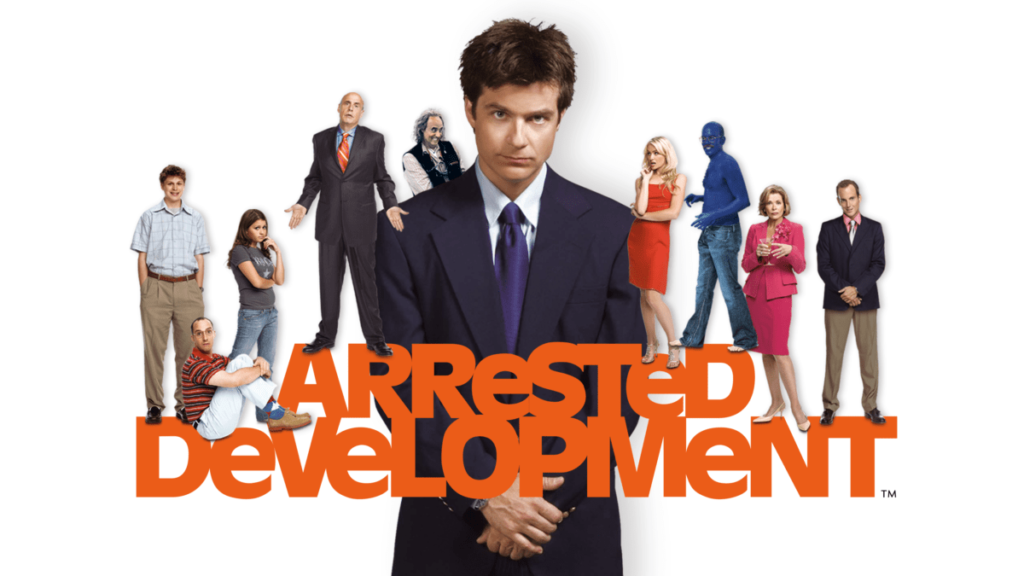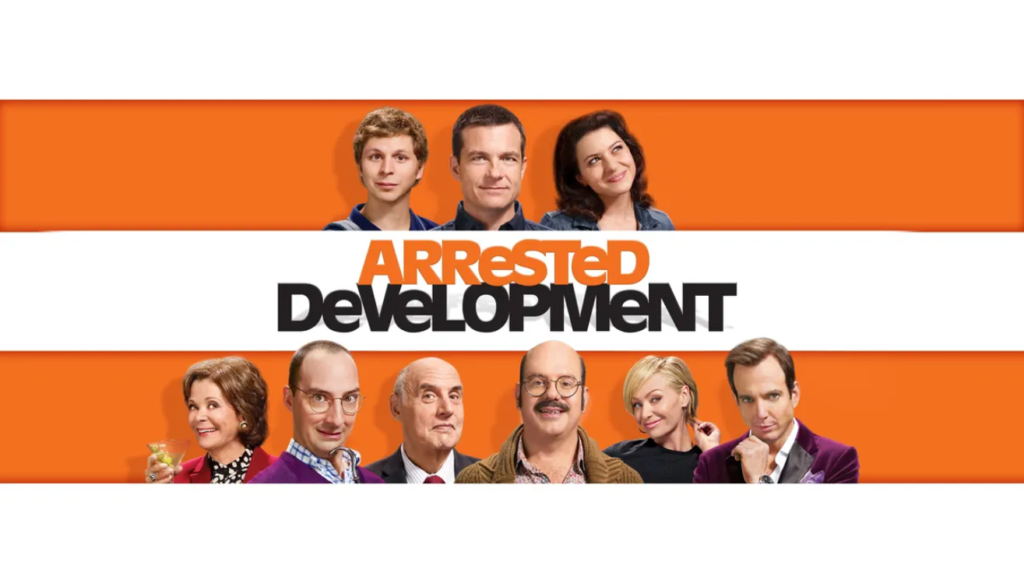
Has anyone in this family ever seen a chicken? – Michael Bluth
Created by Mitchell Hurwitz, Arrested Development is a television series that redefines the sitcom landscape with its sharp wit, intricate storytelling, and eccentric characters. The show, which originally aired on Fox from 2003 to 2006 before being revived by Netflix, follows the dysfunctional Bluth family, whose members are as eccentric as they are endearing. The series is renowned for its intricate, multi-layered narrative structure, rapid-fire dialogue, and a plethora of running gags and callbacks that reward attentive viewers.
Arrested Development is known for its sharp wit and narrative complexity. The series employs a serialized format, with plot points and jokes developing and paying off over multiple episodes, sometimes spanning entire seasons. This serialized approach was atypical for sitcoms at the time, which often relied on self-contained episodes. Also, Arrested Development was revolutionary in its use of meta-humor. The show frequently broke the fourth wall, incorporating self-referential jokes and acknowledging its existence as a TV show. Characters like Michael often addressed the camera directly, and the omniscient narrator (voiced by Ron Howard) provided commentary that was both insightful and humorously ironic. This meta-awareness extended to its social commentary and satire, with the Bluth family’s absurd antics serving as a critique of corporate greed, political corruption, and societal norms. The show’s ability to weave these elements seamlessly into its humor added layers of sophistication and depth. Meanwhile, the show’s writing is densely packed with running gags and callbacks, making it highly rewatchable. Phrases like “I’ve made a huge mistake”, “No touching”, and “There’s always money in the banana stand” take on new significance with each repetition, building a sense of continuity and rewarding dedicated viewers. These recurring jokes not only contribute to the series’ humor but also reinforce the interconnectedness of the Bluth family’s misadventures. Production-wise, Arrested was consistently highlighted for its innovative narrative style, which included a single-camera setup, lack of a laugh track, and a heavy reliance on cutaway gags, all of which were relatively rare in American sitcoms at the time.
Arrested Development also leverages unreliable narration and irony to enhance its comedic impact. The narrator’s omniscient insights provide context and commentary that the characters themselves are often oblivious to, adding a layer of dramatic irony to the proceedings. Flashbacks are used not only to provide backstory but also to create comedic juxtapositions and reveal character traits in a humorous light. In some cases, the narrator’s interjections are essential for certain jokes to land. For instance, in the episode Marta Complex, Tobias Fünke’s audition scene is made significantly funnier by the narrator’s commentary, which highlights the pathetic nature of his competitors
At the heart of Arrested Development is its ensemble cast, each member bringing their quirks and idiosyncrasies to life in memorable ways. Jason Bateman as Michael Bluth often serves as the “straight man,” navigating the chaos of his family’s antics with equal parts exasperation and determination. Jessica Walter’s portrayal of the manipulative, controlling, hypercritical matriarch Lucille, Jeffrey Tambor’s portrayal of the deceitful and self-serving patriarch of the Bluth family, George Sr., and Will Arnett’s performance as the inept magician Gob are particularly standout, each embodying their characters’ flaws and eccentricities and contributing to the family’s dysfunction. The character-driven humor of Arrested Development is a result of its nuanced writing, which balances individual storylines with the overarching narrative. This approach allows for rich character development and complex family dynamics, making the humor a natural extension of the characters’ interactions and relationships.
Arrested Development has had a lasting impact on the television comedy genre, influencing a host of shows that followed. Its pioneering use of meta-humor and serialization as well as the single-camera setup without a studio audience or laugh track helped pave the way for series like 30 Rock, and The Office, which similarly embraced complex narratives and self-referential humor and utilized similar techniques to great effect. Moreover, the series’ complex, serialized storytelling, which demanded close attention and rewarded repeat viewing, has been cited as a precursor to the narrative depth seen in later comedies and dramas alike. The thematic legacy of Arrested Development is also notable, particularly its portrayal of a wealthy family’s fall from grace, which resonated with the socio-economic climate of the 2000s. The show’s satirical take on corporate corruption and familial dysfunction presaged the rise of other “riches to rags” narratives in television, such as Schitt’s Creek and 2 Broke Girls. Also, the show’s ability to blend absurdist humor with pointed social commentary has also been seen as a precursor to more recent critically acclaimed series like Succession and BoJack Horseman. In short, Arrested is a show that doesn’t just break the fourth wall; it dances on its rubble, all while delivering some of the smartest humor ever seen on television.
I don’t understand the question and I won’t respond to it. – Lucille Bluth
